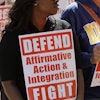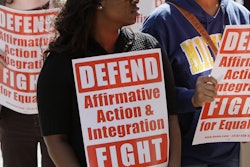Last Wednesday, the U.S. Department of Education issued its final rule on religious liberty and free inquiry, which details protections for faith-based institutions and religious student groups at public universities and seeks to bolster campus free speech.
The rule reflects – and sometimes contradicts – a fraught, growing body of case law about religion and free speech in higher education.
The final rule, which came after 17,000 public comments, requires universities to give equal treatment to religious student groups, which means equal access to university facilities, recognition and funding from student fees, among other things. The rule also defines what it means to be a religious higher education institution so that these schools can continue to be officially exempted from adhering to Title IX where it conflicts with a religious creed. Plus, it reaffirms that these institutions can benefit from department grant programs, so long as the funding isn’t going to religious instruction, worship or proselytization.
Meanwhile, if a public university violates the First Amendment, that’s grounds for the department to withhold federal cash, but only if the university receives a judgement against it in a state or federal court. Private universities can face the same repercussions if they violate their own institutional policies on freedom of speech and academic freedom.
“This administration is committed to protecting the First Amendment rights of students, teachers, and faith-based institutions,” said U.S. Secretary of Education Betsy DeVos in a statement. “Students should not be forced to choose between their faith and their education, and an institution controlled by a religious organization should not have to sacrifice its religious beliefs to participate in Department grants and programs.”
To Dr. Martha McCarthy, presidential professor of educational leadership at Loyola Marymount University, the new rule falls in line with the recent trajectory of U.S. Supreme Court decisions, at least in terms of ensuring government funding can go to religious institutions.
She cited Trinity Lutheran Church of Columbia, Inc. v. Comer, which ruled in favor of a church pre-school receiving federal grant money in 2017, and the 2020 case Espinoza v. Montana Department of Revenue, which sided with parents who wanted to use Montana state government scholarships to send their children to religious schools.
These decisions make the clause separating church and state “somewhat second-tier or maybe even impotent,” she said. The new regulations “conform in spirit with where the court seems to be going.”
But the rule also conflicts with the Supreme Court case Christian Legal Society v. Martinez, said Dr. Charles J. Russo, a research professor of law and Joseph Panzer Chair in Education at University of Dayton.
In 2010, the Supreme Court upheld a lower court decision that allowed the University of California at Hastings’s law school to deny recognition to a chapter of the Christian Legal Society. The student group wanted an exemption from the university’s non-discrimination policy on the basis that their umbrella organization’s “statement of faith” prohibited sexual activity outside the context of marriage between a man and a woman.
That’s why Russo foresees legal conflict over the new rule.
“I’m pretty convinced that someone will bring a lawsuit challenging it,” he said. “I would just about bet that somebody will challenge this.”
He personally likes the rule as a basic protective measure for religious student groups. For example, he cited another case, Rosenberger v. University of Virginia, in which the university wouldn’t allow a religious student group to publish its newsletter using funding from a student activities fund in 1995. Here, the Supreme Court decided, in favor of the students, that this was viewpoint discrimination.
But regardless, the rule feels like a possible “landmine” to challenge Supreme Court precedent. “Whether one agrees with the Christian Legal Society, the case in California, or disagrees, this certainly overturns it,” he added. “And I don’t think the Department of Education has the authority to do that.”
McCarthy predicts another kind of legal challenge. The final rule requires private institutions to follow their own self-determined guidelines on First Amendment rights — and doesn’t require them to have anti-discrimination policies. That means if, for example, LGBTQ students were barred from a religious student club at a private university, faith-based or otherwise, the institution would still be in full compliance with the rule.
In her interpretation, “if [private colleges] have institutional policies that allow discrimination, that’s what they’d be judged on,” she said. “That, to me, does not seem appropriate.”
Meanwhile, public universities find themselves in a “very difficult position” with the impending threat to federal funding, according to Association of Public and Land-grant Universities (APLU) President Peter McPherson.
Freedom of speech on campus is an “area of continuing difficulty [and] conflict within the law,” he said, and different circuit courts interpret Supreme Court decisions on it differently. He thinks the fear of losing education department grants will force public universities to do one of two things: immediately fold to whoever files a free speech lawsuit against them or pour resources into fighting them because the financial stakes of losing a case are too high.
As a former president of Michigan State University, he thinks First Amendment rights are “taken very seriously” at public universities, he added, and he sees “open and free speech” as one of their core values. But putting their federal funding on the line “shifts the scale of justice.”
Granted, government putting requirements on funding is a common deterrent to encourage compliance to regulations, said Russo. But if the department actually withdrew a university’s federal funding over First Amendment litigation, that would be new.
“The ultimate hammer that the feds have against a state, against a school, against an institution is that ‘we can stop funding you if you don’t get in line and follow this rule,’” he said. “I’m not aware of any case where that’s actually happened. [Universities are] going to go to court before they let that happen. I don’t think universities are going to roll over and play dead. I think they’re going to question the motivation of the federal government and its action.”
Sara Weissman can be reached at sweissman@diverseeducation.com.















